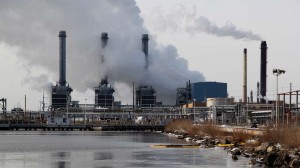Environmentalists weigh in on Pennsylvania Supreme Court race
-
Jon Hurdle

Emma Lee / WHYY
Federal efforts to curb power-plant emissions could be reviewed by the Pennsylvania Supreme Court in coming years, observers say.
Updating to add name of independent candidate.
Four environmental groups on Tuesday endorsed three candidates for November’s elections to the Pennsylvania Supreme Court, saying the court will likely have to make constitutional judgments connected to energy development and carbon emissions in coming years.
Clean Water Action, the Pennsylvania Sierra Club, PennEnvironment, and Conservation Voters of Pennsylvania said they were making their first-ever endorsements for the court because the candidates would help to promote environmental interests when the court hears expected cases on fracking and climate change.
The endorsed candidates, all Democrats, are Christine Donohue, a state Superior Court judge since 2007; Kevin Dougherty, an administrative judge at the Philadelphia Court of Common Pleas, and David Wecht, a Superior Court judge since 2012.
On Nov. 3, they will face Republicans Anne Covey, a judge on the Commonwealth Court; Michael George, a judge on the Adams County Court of Common Pleas, and Judith Olson, a judge who sits on the Pennsylvania Superior Court.
Independent candidate Paul Panepinto, a judge in the Philadelphia Court of Common Pleas since 1991, is also running for election to the Pennsylvania Supreme Court.
The candidates are running for three seats – the largest number of vacancies on the seven-person court since colonial times more than 300 years ago — following the retirements of Chief Justice Ronald Castille and Justice Seamus McCaffery and the primary election loss of Justice Correale Stevens, a Republican. The departures of Castille and McCaffery have left a 3-2 Republican majority which Democrats are seeking to overturn in the upcoming election.
Wecht said that if elected, he would uphold the constitution, including its Environmental Rights Amendment, which he said is one of the few such amendments among state constitutions.
“It’s critical that Pennsylvanians elect justices who are intellectually curious, who are interested in applying our constitution and statutes on a principled basis going forward so that our citizens can benefit from a developed jurisprudence,” he said, during a conference call with reporters.
Wecht said his work on the Superior Court has included cases that look at conservation easements and how they intersect with industrial development.
Dougherty said that, if elected, he would seek to strike a “proper balance” between environmental protection and industrial development.
On the Republican side, Vice Galko, an adviser to Judge George, said he would treat environmental cases like any other.
“Judge Mike George has repeatedly said he will not legislate from the bench,” Galko said. “He is not running with any specific agenda, nor does he favor any special interest.”
If elected, the judge will rule with “discernment, thoughtfulness and a neutral application of the law,” Galko said.
Jim Olson, campaign spokesman for, and husband to, Judge Olson, said she could not comment on specific issues such as Act 13 or the Clean Power Plan that might come before the court but that she does expect the court will have to decide more environmental cases in future.
“She believes there will be an increase in the number of environmental cases that come before the court and it is imperative that the justices approach these cases without any preconceived agenda and reach their decisions on Pennsylvania law and the Pennsylvania constitution,” Olson said.
The court is expected to hear cases connected to its December 2013 Robinson Township ruling in which it struck down parts of Act 13, the state’s wide-ranging law on gas drilling, on the grounds that they violated the constitution’s Environmental Rights Amendment, under which government has a responsibility to maintain environmental quality for its citizens.
“The Robinson Township decision showed the impact that this court can have on environmental protection,” said Josh McNeil, Executive Director of Conservation Voters of Pennsylvania, during the call. “The next court will be determining crucial issues like climate change, like fracking, like protecting human health.”
David Masur, Director of PennEnvironment, predicted the Robinson ruling would be the “first volley” in a series of cases over issues such as whether municipalities can use zoning laws to control natural gas development and whether such zoning meets the requirements of the Environmental Rights Amendment.
Masur said the court could take another look at the constitutionality of Act 13 or other laws that regulate energy development, and or at the implications of infrastructure development as the natural gas industry embarks on a major buildout of pipelines to connect the state’s abundant natural gas resources to market.
He also predicted that the court will hear legal challenges to Pennsylvania’s implementation of the federal Clean Power Plan which requires power generators to make deep cuts in carbon emissions.
Steve Hvozdovich, Pennsylvania Campaigns Coordinator for Clean Water Action, said some municipalities in southwest Pennsylvania are using the Robinson ruling to help drive changes to their zoning ordinances. The changes are being challenged by the gas industry and some residents in cases that may end up in the Supreme Court, he said.
The cases could include one in Middlesex Township, Butler County, where a group of residents and two environmental organizations have challenged a decision by township supervisors to sharply increase the amount of land that can be used for industrial development, Hvozdovich said.
“There is a lot of potential for many different cases to make their way up, which is why we were so focused on looking at the Supreme Court race this year for the first time,” he said. “We wanted to make sure that we had justices that would consider what had been ruled on previously as well as what is clearly outlined in our state constitution.”
















